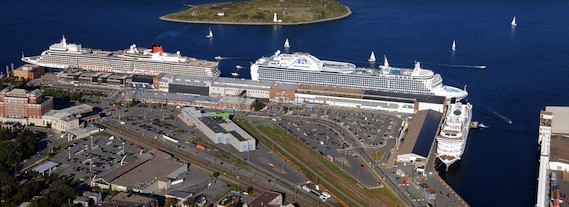The port's senior vice-president, Paul MacIsaac, gave a quick overview of the financials, then vice-president Paul Duvoisin reviewed the growth of the port's container business. The gist of it is that port business has increased, roughly paralleling the recovery of the global shipping industry from the nearly complete shipping stoppage for a few weeks in 2009. Due to some large capital expenditures, however, the port's overall earnings dipped a bit, from $14.5 million in 2011 to $14.2 million in 2012.
Most interesting was port president Karen Oldfield's "walk and talk" presentation. Roaming around the front of the stage, Oldfield addressed some of the challenges and opportunities facing the port.
Oldfield repeated the old port line that Halifax is well-positioned to become a large shipping destination. Pointing at a map that showed the US and Europe, with Halifax represented by a star, Oldfield said that Halifax is "the ham in the sandwich," an oddly un-kosher reference to being positioned between two large economies, the implied take-away being that we can profit immensely because we're roughly half-way between the geographic hearts of both economies. This is also the notion behind the "gateway" concept, which has led to the four-laning of Highway 1 through New Brunswick, a new border crossing at St. Stephen and a proposal for a four-lane superhighway all the way to Buffalo.
The arguments supporting the gateway concept have been repeated ad nauseam by every bureaucrat or crown corporation looking for a federal handout. They've been given academic cover by now-retired Dal professor Mary Brooks, who has written dozens of papers, none that I know of peer-reviewed, promoting the gateway. Here's how Brooks put the geographic argument in 2007:
Canada’s geographic advantage stems from the fact that Shanghai is closer to Prince Rupert and Vancouver than it is to Los Angeles, and Halifax is closer to Antwerp, Belgium, than ports on the U.S. eastern seaboard. Both Vancouver and Halifax are closer to Asian ports than their west and east-coast American competitors—in most cases by a full day or more.This reasoning is entirely ass-backwards.
Shippers don't want to go to the closest port—they want to go to the port that's farthest away. More succinctly, shippers want to get to the port that's closest to their ultimate destination, in order to reduce the much more expensive land-shipping (i.e., trucking) costs.
Here's an analogy. Suppose I need to travel from my office in north end Halifax to the Beford police station, and the bus isn't an option. I could drive from my office to a halfway point, say, Fairview. This would be, in Oldfield's words, the "ham of the sandwich." But then, I'd have to walk the rest of the way. Which is clearly ridiculous.
A much better plan would be to drive to as close as I can get to the police station, say, the Bedford Sobey's parking lot, and then just walk the two blocks up to the police station.
I don't want to travel to the ham in the sandwich. I want to travel from one slice of bread to the opposite slice of bread.
In much the same way, a merchant shipping a container from Antwerp to, say, Indianapolis, doesn't want the ship to end up in Halifax, and then pay for a three-day truck shipment the rest of the way. He wants to get that container as close as he possibly can to Indianapolis by ship—which probably means to New York City or Norfolk, Virginia.
Sure, Halifax can optimize its operation, improve its turn-around times, etc. And for the time-being the port of Halifax has some advantage handling deep-water ships. But New York is dredging its harbour, and both New York and Norfolk are investing billions of dollars into their facilities, especially in rail connections to the US midwest. Halifax will never be able to match that kind of investment.
I don't mean to disparage the operation of the Halifax port. I accept at face value that those in charge are doing a well-enough job, and the port will likely always be a significant part of the local economy (albeit if Melford ever gets up and running, they may as well call it a day). Rather, my point is that these fantasies of Halifax as an east coast version of Vancouver are over-the-top ridiculous. It simply won't happen.
Seaport Market
While I went to the meeting expecting to see a blow-up between the market investors and port officials, that conversation was short and polite. Investors Dick Evans and Frank Schwartz asked a couple of questions, essentially wanting to know what the port did with the money, and MacIsaac said that the port actually lost a little money on the takeover of the market.The Seaport issue is too complex to detail here, and Evans told me that the investors will meet May 29 to consider their options. I'll have a more detailed report after that meeting.














